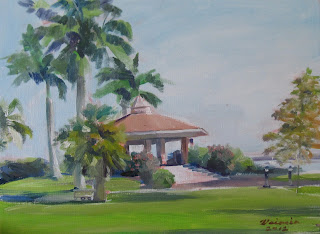Yesterday my friend Trudy called me from Punta Gorda, asking if I would join her group in portrait studio on Thursday. Unfortunately, it conflicts my drawing class at FGCU, so I told her I was sorry but was unable to join them till after Christmas. She was a nice lady and was so kind as to take care of my pantings and the award ribbon and kept them for me while I was in New York. Therefore, I thought to myself that it would be better to go today and get them back, especially when she was volunteering today at the VAC library. However, the round trip was more than 80 miles. In order to make the trip more worthy, I decided to paint today in Punta Gorda. I left home early in the morning and went to Gilchrist Park. The above picture is what I did there. Hope you like it.
One more thing, recently I have been reading Emily Dickinson. I know her poems are not easy to read. Something I read about her piqued my interest in her poems. I felt I share her attitude about life and art. She was an obssessively private person and writing poems was totally a personal thing to her. As for her poems, I believe in what Robert Forst said about poems. He said poems should be read metaphorically. Poets talk about one, but suggest something else. In other words, we each can read our own meaning into poems based on our experiences.
In the collection The Single Hound, there are several poems in which she mentions soul. For instance,
The soul that hath a guest
Doth seldom go abroad -
Diviner crowd at home
Obliterate the need,
And courtesy forbid
A host's departure, when
Upon Himself be visiting
The Emperor of Men!
I have to say the word soul often causes my reflections because I clearly remember some of my experiences in which I felt I needed to stop to think because of this word. In most occasions, the English word could be equevalent to the Chinese word "灵魂”。
The first time I remember I pondered the meaning of the word was when I read Chinese writer Lu Xun's novelette Benediction in which the protagonist, a two-timed widow, who feared her two deceased husbands would fight over her in the next life, asked everyone she met whether human soul would still exist after death. At that time I understood soul as something spiritual that would survive our physical existence. To me it was a simple conception, that is, my "conscience". If I read meaning into Dickinson's poem, conscience is the guest that keeps "soul" home?
Later when China opened its door and I began to have some contact with American literature. I remember when we were discussing Sherwood Anerson's Grotesques of Winesburg, Ohio, the American professor suddenly asked us, "Do Chinese believe in soul?" I began to sense some difference in Western conception of soul than Chinese. It seemed to be more than just "conscience" and encompass the power that control the way of thinking and doint things. Later on, I realized Western interpretation of soul had a lot to do with religious belief. Talking about soul is a kind of self-reflection.
Then I read Yale scholar Francis Hsu's Passage to Differences. Hsu observes that there is a difference between Chinese and Westerners in terms of attitude about religion. According to his analysis, traaditionally Chinese don't have as much religious passion as Westerners because of Confucian ideology. He mentioned that even though China is traditonally an pantheist society and that if there is a kind of thing which functions close to a religion, it is Confucianism. However, Confucianism is, at most, a quasi-religion. Cofucius was never interested in things supernatural. He once said, "Just focus on this world and never mind about the world of the guosts or deities/gods. He promoted ancestor worship instead of any supernatural powers. Does that explain it?
Recently, I sort of had another round of the previous experiences. My friend Ben Harris, who is interested in China and things related to China, one day asked me, "What is the sould of the Chinese?" I am not sure if I gave him a satisfactory answer. I reflected all my experiences with the term "soul", I really feel, like Dickinson's poem, everyone can read his/her own meaning into it. As far as religion is concerned, I believe my personal experiences are illustrative of at least a part of Chinese American community. In a pantheist society like China, my Buddhist parents, who lived in the French settlement of Shanghai, sent all their children to an American Baptist school across the street in the British Settlement. When communitsts came to power, of course, everyone became an atheist, willingly or not. Since I came to this country, I tried to rekindle my religious passion, but was soon turned off by evangelists' corruption and their attitude about science. I still respect religious believers and have many friends among them, I have stopped going to church. No matter what, I still have the original conscience with me in soul.

http://mchaabaty.com/gypsum/
ReplyDeletehttp://mchaabaty.com/fire/
http://mchaabaty.com/pictures/
https://decor-ksa.com/laser-cut-doors/
https://decor-ksa.com/villas-doors/
http://mchaabaty.com/dawadmi/
ReplyDeletehttp://mchaabaty.com/templates/
http://mchaabaty.com/riyadh/
http://mchaabaty.com/stone/
http://mchaabaty.com/heritage/